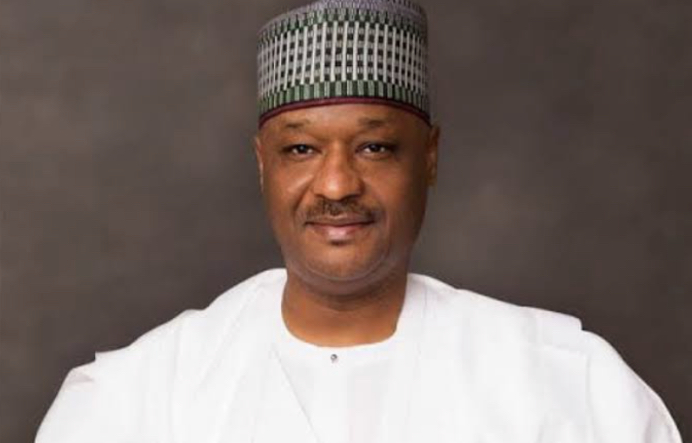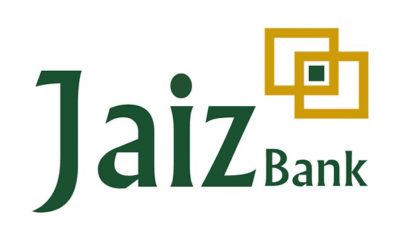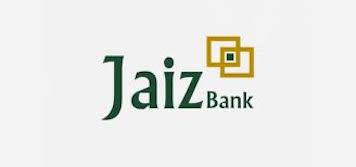BUSINESS
Jaiz Bank Appoints Acting Chairman

Jaiz Bank said it has appointed a new chairman in an acting capacity following the resignation of Umaru Abdul Mutallab from its board of directors.
The non-interest bank has endorsed the appointment of Musbahu Bashir as its acting chair subject to the approval of the Central Bank of Nigeria.
Prior to his appointment to the new role, Mr Bashir chaired the bank’s Board Investment Committee, and has been a member of Jaiz Bank’s board of directors since 2012.
He is currently the chairman of Althani Group of Companies, and Cobalt International Services, which he has chaired for nearly two decades.
Mr Bashir is a director of Mafab Communications Limited, Resource Capital Group and Offshore Technologies International Limited.
“He obtained a BBA in Business Management in 1998 from Tafawa Balewa University, Abuja campus and a National Diploma in Irrigation Engineering from Kaduna State Polytechnic 1987,” the document said.
BUSINESS
CBN Revamps Agric Guarantee Scheme, Targets Smallholder Farmers

The Central Bank of Nigeria (CBN) has launched a major overhaul of the Agricultural Credit Guarantee Scheme Fund (ACGSF), unveiling a new strategic direction aimed at expanding credit access to smallholder farmers and accelerating national food security efforts.
Speaking in Abuja at the inauguration of the reconstituted ACGSF Board, CBN Governor, Olayemi Cardoso, described the revamp as “a new dawn” for agricultural financing.
He said the initiative reflects the Federal Government’s renewed commitment to reposition agriculture as a driver of inclusive growth, rural development, and economic diversification.Cardoso noted that the ACGSF-established in 1977-remains one of the country’s most impactful development finance tools.
Yet, despite employing nearly two-thirds of Nigeria’s labour force and contributing over 20 per cent to GDP, the agric sector continues to receive less than five per cent of total bank credit. This structural mismatch, he said, has stunted the potential of millions of farmers for decades.The CBN governor stressed that the agricultural landscape has evolved far beyond subsistence farming, now governed by integrated value chains, technology, climate risks and a growing agritech ecosystem. In line with these realities, he said the Scheme must transform into a dynamic, data-driven institution capable of supporting modern agriculture.
He highlighted the 2019 amendment that expanded the Scheme’s share capital from N3 billion to N50 billion and broadened its operational scope. One of the notable enhancements, he added, is the inclusion of farmers’ representatives on the new Board-an “inclusive and strategic” move to ensure policies are grounded in real sector needs.
Cardoso emphasised that the central objective of the revamp is to unlock affordable credit for smallholders who account for 90 per cent of the nation’s agricultural output but remain underserved due to limited collateral, poor credit history and weak access to financial services.
He urged the Board, chaired by Dr. Olusegun Oshin, to design products tailored to women, youth and other underserved groups while leveraging fintechs, microfinance banks and cooperatives to deliver innovative lending models. He also called for the deployment of technology-from satellite imagery to digital dashboards-to track loan utilisation and ensure measurable impact.
Dr. Oshin welcomed the reforms and advocated further expansion of the Fund to meet the scale of investment required for meaningful sectoral transformation.
| ReplyReply allForwardAdd reaction |
BUSINESS
Okonjo-Iweala, Others Urge Youths to Drive Reforms, Strengthen Civic Action

National leaders have challenged youths to lead Nigeria’s renewal, warning that meaningful change now depends on young citizens organizing, demanding accountability and driving sustained civic action.
They made the call on Wednesday night at the 15th anniversary of Enough is Enough Nigeria (EiE), held in Lagos, with the theme “Footprints and Frontlines”.
EiE is a civil society organisation advocating for accountable governance and citizen participation.
In a virtual keynote address, Director-General of the World Trade Organisation (WTO), Dr Ngozi Okonjo-Iweala, urged young Nigerians to lead change with courage and conviction.
She recalled her 2010 message to youths, saying it remained relevant.
“Do not wait and watch. Do not ask for permission. Get up, organise and make a difference,” she said.
Okonjo-Iweala noted that with 70 per cent of Nigeria’s population under 30, young people hold huge influence in shaping the country’s direction.
She urged them to use their numbers constructively while confronting persistent challenges such as unemployment and poor access to capital.
She praised EiE’s “Office of the Citizen” initiative for empowering communities to demand transparency and improved public services, adding that civic pressure was crucial for reform.
“Real change depends on organised, determined and courageous young citizens,” she said.
In his remarks, Emir of Kano and former Central Bank Governor, Mohammad Sanusi, said rebuilding Nigeria required honesty and collective responsibility.
“As citizens, we must remember this nation belongs to us. We have done enough damage. Enough is enough, we need to stop,”he said.
Sanusi said Nigeria had repeatedly missed development opportunities because public office was often treated as personal property.
He called for a shared national vision that transcends ethnicity, religion and political interest.
Bishop Matthew Kukah of the Catholic Diocese of Sokoto commended EiE for its resilience in advancing social justice and called on Nigerians, especially the youth, to persist in the struggle for a fair society.
“The journey to justice and fairness has no finish line.
Let us remain relentless in building a Nigeria that is just, equitable and bigger than all of us,” Kukah added.
Former Minister of Communication Technology, Mrs Omobola Johnson, emphasised collaborative effort in nation-building, saying development required hard work, sacrifice and citizens’ willingness to contribute their “time, talents and treasures.”
Executive Director of EiE, Yemi Adamolekun, said Nigeria continued to underperform because citizens were not demanding enough from leaders.
She urged Nigerians not to detach their personal progress from the fate of the country.
She said, “Whatever industry we work in, if Nigeria becomes a failed state, we will all suffer. Silence is not an option. Evil is amplified when good people stay silent.”
After highlighting EiE’s milestones over the past 15 years, Adamolekun announced 36-year-old Mrs Ufuoma Nnamdi-Udeh as the organisation’s new Executive Director.
The anniversary also featured the relaunch of Footprints: Past, Present, Future (2nd Edition), compiled by EiE and forwarded by the late diplomat Dr Christopher Kolade, in whose honour the event was partly dedicated.
Attendees also watched the premiere of One Voice, Many Echoes, a short film featuring archival footage from the 1993 election annulment protests, the 2010 Enough is Enough marches and the 2020 EndSARS demonstrations.
BUSINESS
EFCC Seeks Stronger Alliance with CSOs, Media in Anti-corruption Fight

The Economic and Financial Crimes Commission (EFCC) has called for deeper collaboration with Civil Society Organisations (CSOs) and the media in the fight against corruption, describing both groups as “critical drivers of national change.”
Acting Zonal Director of the EFCC, Kaduna Zonal Directorate, Bawa Usman Kaltungo, made the call on Thursday in Kaduna at a one-day sensitisation workshop for journalists and CSOs.
Kaltungo, who spoke on behalf of the EFCC Chairman, Ola Olukoyede, said the workshop was organised to strengthen cooperation between the commission and key stakeholders whose roles remain vital to public accountability and national integrity.
According to him, CSOs serve as the conscience of society and a bridge between citizens and government, while journalists use the “powerful pen” to shape public opinion and expose wrongdoing.
“Together, you are indispensable allies in safeguarding our economy and our collective future,” he said.
Kaltungo stated that the EFCC had benefited significantly from intelligence and information shared by CSOs and the media, which had helped expose suspicious financial transactions, abuses of office and systemic fraud.
“Our fight against corruption is not a solo mission. It requires synergy, trust and shared intelligence,” he said, urging the participants to use the workshop as a platform for open dialogue and strengthened collaboration.
Kaltungo commended the EFCC Public Affairs Department for organising the programme and formally declared the workshop open.
Earlier, Head of Public Affairs, EFCC Kaduna Zonal Directorate, Zainab Ahmed, outlined the objectives of the workshop, describing CSOs and journalists as the Commission’s “most valued stakeholders.”
She said the workshop was designed to deepen understanding of the legal and practical processes involved in prosecuting financial crimes, emerging threats in the digital space, and the preventive responsibilities of non-state actors.
“Our goal is to ensure all participants leave better informed, better connected, and better equipped to play their respective roles,” she said.
A presentation by the Head of Legal and Prosecution, Nasiru Salele, took participants through key issues in financial crime prosecution, including levels of involvement, evidence assessment and investigation procedures.
Salele identified challenges affecting prosecution, such as uncooperative judges and frequent transfers of Federal High Court judges.
He also highlighted advancements in EFCC investigations, including the use of AI tools and strengthened international cooperation.
Another session, led by Ayukor Ovirororo of the Procurement Fraud Section, focused on cryptocurrency-related crime. He explained how criminals store, move and launder crypto assets through centralized and decentralized exchanges.
Ovirororo warned that while cryptocurrency offers economic opportunities, it also poses national financial risks, citing recent high-profile cases as examples of unregulated digital operations escalating into major threats.
The final session, presented by Tony Orilade, Head of Public Interface at the EFCC Headquarters, centred on the preventive roles of CSOs and the media.
He emphasised the impact of investigative journalism, policy advocacy, public awareness campaigns and monitoring of government activities.
Orilade added that CSOs also provide safe platforms for whistle-blowers and play a significant role in shaping stronger anti-corruption frameworks.


























